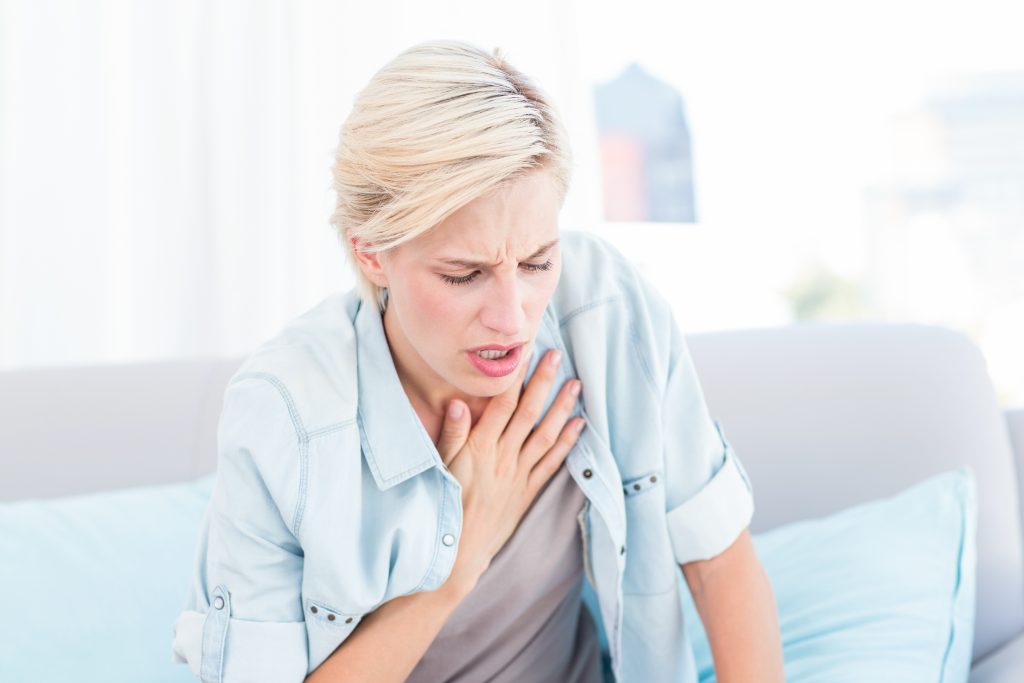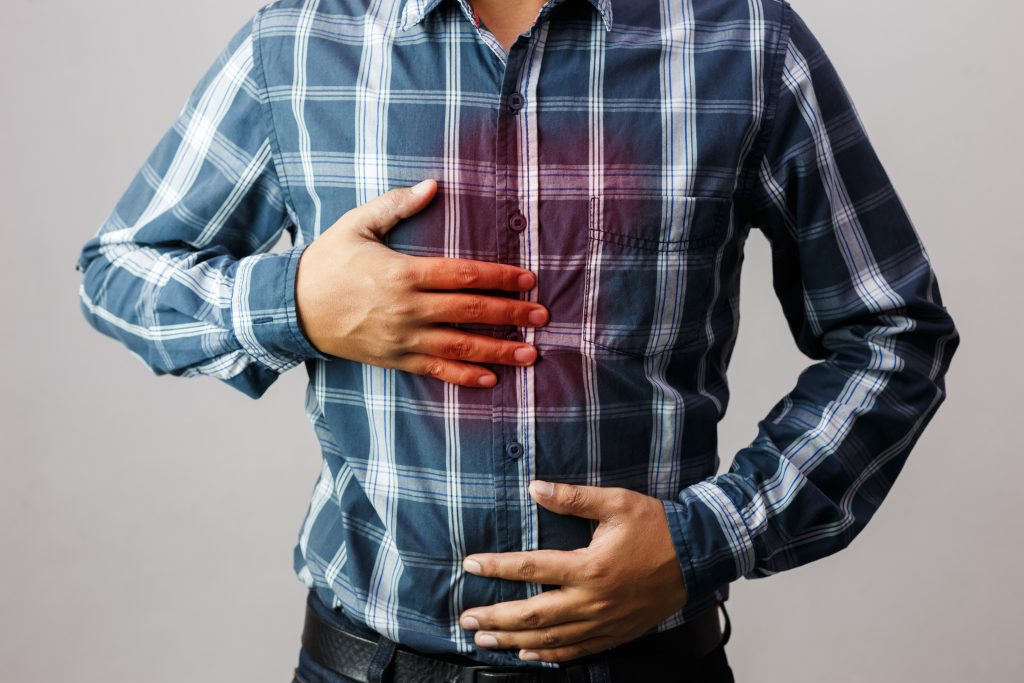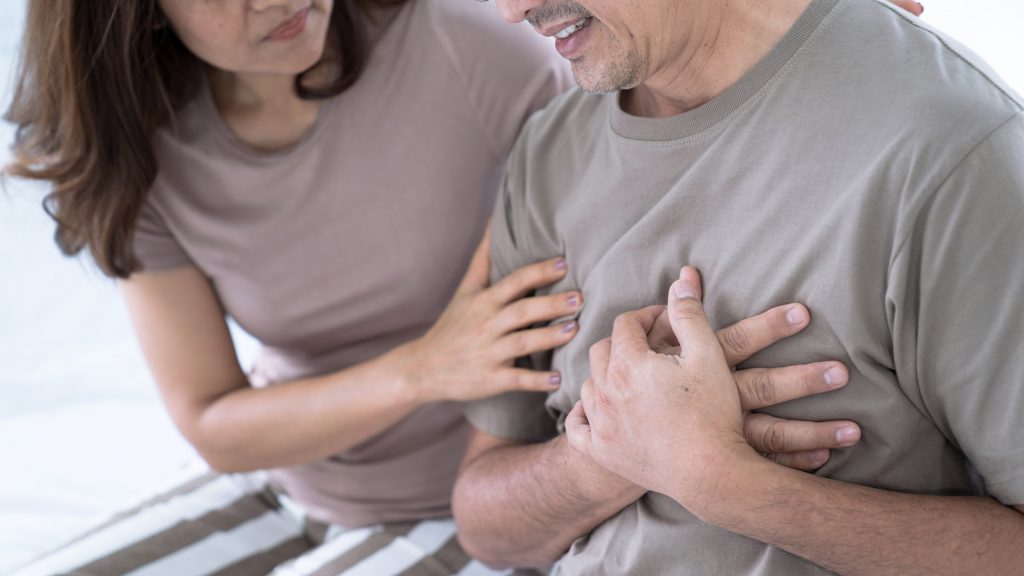March 25, 2022
5 Causes For Shortness of Breath After Eating
You may find that you have shortness of breath after eating, including wheezing after eating. There are several reasons why you may feel out of breath when eating or afterward, and in some instances, such as when you inhale your food quickly, this shortness of breath occurs immediately. In other instances, you may feel a tightness in your chest or even the sensation of suffocating.
Dyspnea — the medical term for shortness of breath — can be alarming, especially if it just starts happening out of the blue and you have no idea why. You may not even understand what you’re experiencing, as most people don’t know what shortness of breath really feels like.
Just for the record, there’s a difference between feeling out of breath and feeling as if you’re not able to get enough air. Feeling as if you’re not able to get enough air into your lungs is the simple definition of shortness of breath.
The causes for shortness of breath after eating can be related to underlying medical problems as well. For example, it could be an unknown food allergy or worse, a lung condition. In this article, we’re going to discuss five of the most common reasons why you may feel like you can’t breathe after eating.
1. Anaphylaxis
Anaphylaxis is defined as a severe allergic reaction, and shortness of breath after eating is usually the very first symptom. Anaphylaxis usually occurs quickly, within minutes after eating something that you’re allergic to.
Other symptoms of anaphylaxis include urticaria (hives) and swelling of the lips and airways. These symptoms mostly occur when the allergic reaction is severe, but it’s common for people to only experience shortness of breath after eating something they’re allergic to.
The most common food allergies include shellfish, eggs, dairy, peanuts, and tree nuts. Food allergies can develop at any stage of a person’s life with no medical explanation as to why. Epinephrine injections (Epi-Pens) are the primary treatment for anaphylaxis, which can also help with an asthma attack if necessary.
2. Gastroesophageal Reflux Disease
In gastroesophageal reflux disease (GERD), the lower esophagus opens frequently or fails to close the right way.  This process, also referred to as acid reflux, causes stomach acid and food to get regurgitated from the stomach and into the esophagus.
This process, also referred to as acid reflux, causes stomach acid and food to get regurgitated from the stomach and into the esophagus.
When acid reflux occurs more than twice per week, it’s an indication of having GERD. While the symptoms of GERD can happen at any time, day or night, eating tends to be its biggest trigger, with the main symptom being shortness of breath.
Additional GERD-related symptoms may also include chest tightness or a burning sensation in the lower portion of the chest or middle abdomen, as well as hoarseness, dry coughing, trouble swallowing, and even asthma. GERD treatment is geared towards symptom prevention, which includes making lifestyle changes such as dietary restrictions and taking or changing medications.
3. Hiatal Hernia
Hiatal hernia is a condition in which part of the stomach pushes up into the chest cavity, usually through the diaphragm muscle. It enters through an opening where the esophagus passes on its way to the stomach, and it’s often associated with heartburn, acid reflux, and general abdominal discomfort.
The symptoms of a hiatal hernia are similar to that of GERD, which is why they’re often triggered by eating — especially shortness of breath.
There are many reasons why Hiatal hernias occur, including tobacco use and obesity. Surgery is usually recommended to repair the hernia to help prevent acid reflux which also helps with the shortness of breath.
4. Arrhythmia
Arrhythmia is characterized by an irregular heartbeat. Arrhythmia is a very common condition and often harmless. However, it does come with several symptoms, including shortness of breath after eating.
Of course, long-lasting or more serious arrhythmias will also cause shortness of breath at other times and rapid heartbeat, chest pain, dizziness, fatigue, and fainting spells. In the case of severe arrhythmia, cardiac arrest is also possible.
Treatment for ongoing arrhythmia usually includes medication, surgery, and lifestyle changes in regards to fitness and dietary changes. Keep in mind that these treatments are meant to prevent heart attack and stroke, as severe arrhythmia can lead to them when left untreated.
5. Chronic Obstructive Pulmonary Disease
Chronic obstructive pulmonary disease (COPD) is a chronic inflammatory lung disease that’s both progressive and irreversible. It is more common in older adults, smokers, or those with exposure to secondhand smoke.
With COPD, the airways and lungs become more damaged, making it harder for air to flow in and out. Individuals with COPD often feel shortness of breath after eating because large meals can take up a lot of space in both the stomach area and chest. This puts pressure on the diaphragm as well as the lungs.
Since larger meals take more time to digest, the shortness of breath after eating is usually compounded with feelings of fatigue. Other symptoms include chronic cough, chest tightness, difficulty breathing, mucus production, and wheezing.
Treatment for COPD usually includes various forms of medicines dispensed through an inhaler. Preventive vaccines for the flu and pneumonia are also recommended as well as oxygen therapy.
When to Seek Medical Attention
Shortness of breath, whether it occurs after eating or regularly, is a significant medical concern. If you experience shortness of breath after eating frequently, it’s something you should pay attention to — especially if it’s accompanied by any other symptoms, like pain in the chest, acid reflux, swelling, and so on.
There’s no way to tell on your own if your shortness of breath is related to conditions like GERD or COPD. Therefore, you’ll want to get your breathing difficulties diagnosed by a doctor as soon as possible. You may need to change your eating habits, or you may need consistent treatment.
To find out what’s causing your shortness of breath after eating, book an appointment with us today at one of our several locations.
DISCLAIMER
The information featured in this site is general in nature. The site provides health information designed to complement your personal health management. It does not provide medical advice or health services and is not meant to replace professional advice or imply coverage of specific clinical services or products. The inclusion of links to other web sites does not imply any endorsement of the material on such websites.